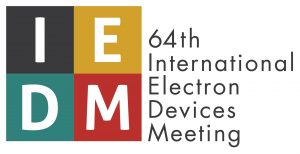[ad_1]
With 230 scheduled presentations, the conference’s tradition of spotlighting more leading work in more areas of the field continues, even as it evolves to support the interdisciplinary and continuing educational needs of today’s scientists, engineers and students.
“This year’s program shines the spotlight on diverse technology advances that are driving the electronics industry forward, such as neuromorphic and 3D integration; device concepts for 3nm; progress in many types of advanced memories; new high-mobility channel materials, interconnect strategies; and many others,” said Kirsten Moselund, IEDM 2018 Publicity Chair and Research Staff Member at IBM Research–Zurich. “Also, this year the IEDM once again will feature special sessions of invited papers focused on some of today’s most important areas of research. This year’s Focus Session topics are quantum computing, 5G wireless communications, wide-bandgap power devices, and the future of interconnects.”
“Apart from the technical program itself, the 2018 IEDM offers many other opportunities to gain insight into new technologies, to interact with technology leaders, and to take part in stimulating discussions,” said Rihito Kuroda, IEDM 2018 Publicity Vice Chair and Associate Professor at Tohoku University. “The weekend tutorials and Short Courses, for example, provide outstanding opportunities to learn what is happening at the frontiers of many different technologies. The Tuesday evening panel offers the chance to debate the future of EUV patterning technology with key technologists, while a new luncheon format earlier that day provides the opportunity to hear industry leaders give their personal career reflections. Also, a supplier exhibition will be held once again to showcase products and services which support the industry.”
Here are details of the 2018 IEDM:
90-Minute Tutorials – Saturday, Dec. 1
A series of 90-minute tutorial sessions on emerging technologies will be presented by experts in the fields, bridging the gap between textbook-level knowledge and leading-edge current research.
- Reliability Challenges in Advanced Technologies, Ryan Lu, TSMC
- STT-MRAM Design and Device Requirements, Shinichiro Shiratake, Toshiba Memory
- Quantum Computing Primer, Mark B. Ritter, IBM
- Power Transistors in Integrated BCD Technologies, Hal Edwards, Texas Instruments
- Design-Technology Co-optimization at RF and mmWave, Bertand Parvais, IMEC
- Emerging Device Technologies for Neuromorphic Computing, Damien Querlioz, CNRS
Short Courses – Sunday, Dec. 2
Full-day Short Courses will be held, offering the opportunity to learn about important areas and developments, and to network with experts from around the world.
- It’s All About Memory, Not Logic!, organized by Nirmal Ramaswamy, Micron
- DRAM: Its Challenging History and Future, Dong Soo Woo, Samsung
- 3D Flash Memories: Overview of Cell Structures, Operations and Scaling Challenges, Makoto Fujiwara, Toshiba Memory Corporation.
- Emerging Memories Including Cross-Point, Opportunities and Challenges, Kiran Pangal, Intel
- Memory Reliability, Qualification and their Relation to System-Level Reliability Strategies, Todd Marquart, Micron
- Future of the Packaging Technologies for High Bandwidth Memory, Nick (Namseog) Kim, SK Hynix
- Processing in Memory (PIM): Performance and Thermal Challenges and Opportunities, Mircea Stan, UVA
- Scaling Survival Guide in the More-than-Moore Era, organized by Jin Cai, TSMC
- Extreme-UV Lithography – Principles, Present Status and Outlook, Tony Yen, ASML
- MOSFET Scaling Knobs (GAA, NCFET…) and Future Alternatives, Witek Maszara, Globalfoundries
- Overcoming Variation Challenges, Sivakumar Mudanai, Intel
- Embedded Memory: Present Status and Emerging Architecture and Technology for Future Applications,Eric Wang, TSMC
- 3D Integration for Density and Functionality, Julien Ryckaert, Imec
- Advanced Packaging: the Next Frontier for Moore’s “Law,” Subramanian Iyer, UCLA
Plenary Presentations – Monday, Dec. 3
- Future Computing Hardware for AI, Jeffery Welser, Vice President, IBM Research-Almaden
- “4th Industrial Revolution and Foundry: Challenges and Opportunities,” Eun Seung Jung, President of Foundry Business, Samsung Electronics
- “Venturing Electronics into Unknown Grounds,” Prof. Gerhard P. Fettweis, TU Dresden
Luncheon – Tuesday, Dec. 4
IEDM will have a new career-focused luncheon event this year featuring industry and scientific leaders talking about their personal experiences in the context of career growth. It will be moderated by Curtis Tsai of Intel, and the speakers will be:
- Veena Misra, Distinguished Professor and Director of the ASSIST Center at NC State University
- John Chen, Vice President of Technology and Foundry Management at Nvidia
Evening Panel Session – Tuesday evening, Dec. 4
- EUV: Too Little, Too Late, Too Expensive or the Ultimate Cure-All?, organized by Sanjay Natarajan, Senior VP of Applied Materials. Much progress has been made in EUV patterning technology, and yet manufacturing throughput, masks, pellicles and resists still persist as problems today. The complexity of reliably transferring features at the 7nm node and below using quadruple patterning and 193nm immersion is affecting yield, affecting the cost-per-gate reduction and slowing down Moore’s Law. The industry eagerly awaits EUV, but is it too little, too late and too expensive, or is it the ultimate panacea? A team of world-renowned experts from the leading logic and memory IDMs, foundries and fabless companies will vigorously debate the issue.
Vendor Exhibition/Poster Sessions
- A vendor exhibition will be held once again.
- This year two poster sessions will be held, one on MRAM technology organized by the IEEE Magnetics Society, the other a student research showcase hosted by the Semiconductor Research Corporation.
Further information about IEDM
For registration and other information, visit www.ieee-iedm.org.
[ad_2]
Source link

